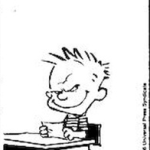A guest post by Brian Herbert.
There are many pieces of advice I could give to myself if I were a new writer at the start of my career. From the perspective of decades later and millions of words in print, there is much I could say about the decisions I have made, the paths I have taken, the worlds I have created, and the characters who inhabit them. I could encourage the fledgling writer to be observant and keep a journal, to write every day, and to develop a thick skin, so that he doesn’t give up, even in the face of having his stories rejected repeatedly. I could lengthen this list considerably with tip after tip . . details about how to plot, how to build character files, how to build suspense, and how to market his stories. Structural and practical details, and they would be useful.
But there is an even more important piece of advice, one that I consider to be the most valuable of all.
It has been said that a writer should not write for money, that this should not be his first thought when a piece is created. In this line of reasoning, if he discovers and nurtures his talent, the money is sure to come later. Eventually, he will receive piles of cash; he just needs to write without getting paid much for a while, and the income will come later. This advice is interesting on the surface, but if a new writer really has creative integrity, he will not expect the money to come at all. Such a possibility will not even be in the back of his mind. He will be engaging in the creative process for an entirely different reason.
In writing, as in art, many people copy the work of professionals they admire. Art students sit in museums trying to replicate the works of great masters, seeking to learn their painting techniques. Would-be fantasy writers read Tolkien over and over, and then produce stories that mimic the works of the master. They say they were “inspired” by Tolkien. This happens in other literary genres as well—mystery, adventure, romance, science fiction, mainstream.
Many writers are looking for a handy formula, on which they can hang their own words as a sort of façade—a way of masking the fact that they are not being original, and perhaps that they are not capable of being original. Some musicians do this, and produce works that sound very much like those of others. It happens throughout society, with one product looking very much like another one. Automobile after automobile, house after house, commercial after commercial, book after book, movie after movie.
If something sells, it has countless imitators. But I would tell the new writer that taking this path would be selling his creative soul. If he were to take that route—be it in art, writing, music, or any other art form—he is not truly being himself; he is trying to become someone else. The most important thing a writer of integrity can do is to have the courage and honesty to find himself, and to express that self in words.
Originality is a noble goal.
I’m not saying it’s easy to attain this objective. Corporate publishers want material that is similar to other material they have published “successfully” (i.e. that has made money), and writers naturally fall into that trap. In order to sell their stories they think they must copy, because another writer has made a name for himself that way, and writers are desperate to be successful, and to be paid well. So they replicate the works of others (like taking a recipe and changing an ingredient), and make excuses for doing so. After all, certain ideas are already out there being copied, and writers are getting away with it, so why not jump on the bandwagon? Why not be “inspired” by a writer you admire?
There are many temptations leading the would-be writer onto that course, telling him to do exactly this. If he takes the bait, he rationalizes doing so in any number of ways. People are good at rationalizing, at finding excuses for less-than-noble behavior.
Admittedly, I’m being idealistic, considering the trickiness and laziness of human nature. But I’m talking about human potential here, about a writer’s own personal potential. I would encourage him to try going inward, instead of picking the ideas of others like fruit from a tree. Try going deep inward. Have the courage and the patience to do this, and see what is there. Look for integrity and originality, in the deepest regions of personal consciousness. A person might find a real pearl there, instead of an imitation.
The new writer might ask how this can possibly be accomplished, if he needs to make a living. The bad news is, that for this approach, he might need to keep his day job for awhile, and perhaps for much longer than that. Think of the great artists and writers who never found commercial success in their lifetimes, but stuck to what they believed in anyway. They stayed the course, knowing deep within that they were creating important works, and that one day they would be recognized. This type of writing from deep within, this type of artistic expression, should not be done for money, not in the near term or in the long term. It should be done for an entirely different reason.
It should be done for the holy grail of creativity, in a heroic effort to find the writer’s own originality. It has been said that each of has at least one interesting story to tell, at least one book within each of us. I would also like to think that each human being has at least one original thought.
I’m not going to tell a new writer how to accomplish this inward journey, only that he should make the attempt for his own sake, no matter how arduous it is. After all, if I were to provide detailed instructions on how to attain the holy grail of creativity, it would be a formula, and that’s exactly what we are seeking to avoid.
 Guest Writer Bio:
Guest Writer Bio: BRIAN HERBERT is the author of multiple New York Times bestsellers. He has won several literary honors including the New York Times Notable Book Award, and has been nominated for the highest awards in science fiction. In 2003, he published DREAMER OF DUNE, a moving biography of his father Frank Herbert that was a Hugo Award finalist. His acclaimed novels include SIDNEY’S COMET; SUDANNA, SUDANNA; THE RACE FOR GOD; TIMEWEB; THE STOLEN GOSPELS; and MAN OF TWO WORLDS (written with Frank Herbert), in addition to the HELLHOLE Trilogy and thirteen DUNE-series novels co-authored with Kevin J. Anderson. In 2013, Brian published OCEAN, an epic fantasy novel about environmental issues (co-authored with his wife, Jan). Brian’s highly original SF novel, THE LITTLE GREEN BOOK OF CHAIRMAN RAHMA, was published by Tor Books in July 2014.
 I loved to write as a teen-ager. I even completed drafts of two novels by filling hundreds of pages of notebook paper with my cramped, almost illegible handwriting. I was going to be a writer, I just knew it. Then I got to college and got side-tracked into other things, including a computer programming career.
I loved to write as a teen-ager. I even completed drafts of two novels by filling hundreds of pages of notebook paper with my cramped, almost illegible handwriting. I was going to be a writer, I just knew it. Then I got to college and got side-tracked into other things, including a computer programming career.




